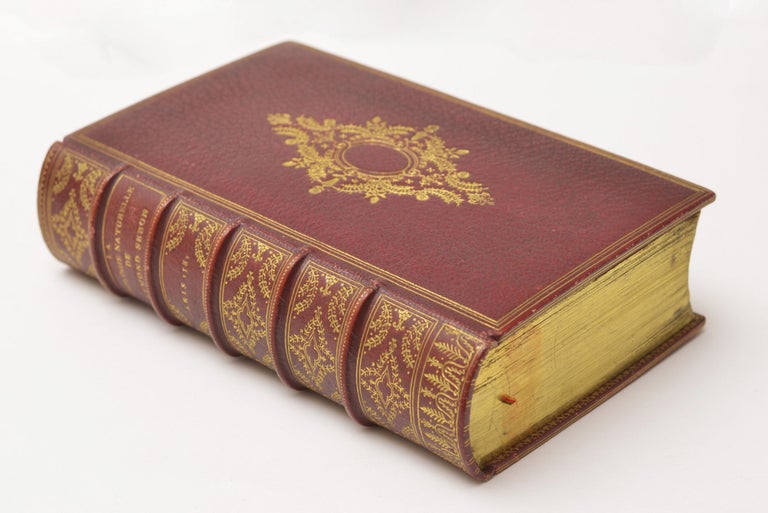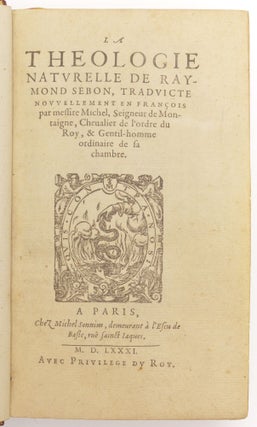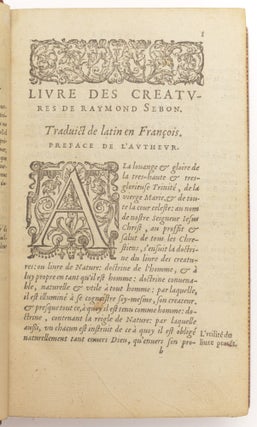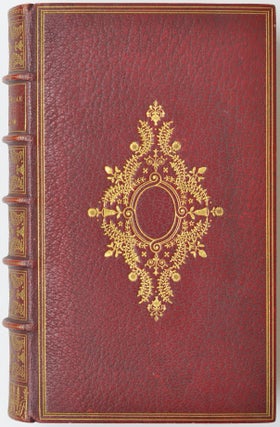La Theologie naturelle de Raymond Sebon, traduicte nouvellement en François par messire Michel, Seigneur de Montaigne, Chevalier de l’ordre du Roy, & Gentil-homme ordinaire de sa Chambre.
Paris: chez Michel Sonnius, demeurant à l’Escu de Basle, ruë Sainct Iaques, M.D.LXXXI [1581]. Bound in red maroquin, the panels ruled and decorated with a large, gilt floral design in the center, their fore and inner edges are gilt. Spine with five raised bands, gilt decoration, and title. Marbled pastedown. All edges gilt. (2) ff., 469 (ie 496) pp., (30) ff. Printed bookplate of P. F. Arminjon on front end pastedown. Ten leaves slightly over trimmed that has a minor effect on the initial or final letters of the printed marginal notes but no effect on their legibility. Overall a very well preserved and beautiful copy of this scarce volume.
Extremely scarce second, revised edition. Just as rare as the first (1569) of Montaigne's first book, the French translation of Theologia Naturalis, the important source of natural theology, written by Raymond Sebond, the 15th-century Catalan theologian.
Sebond’s text was composed around 1435 in Latin, and it was first published in 1487. It declares that not merely the Bible, but also Nature is a Divine revelation, and holding a position against the scholastic antithesis, the concept that reason and faith, philosophy and theology are antithetical and irreconcilable.
Montaigne made his translation of Sebon’s text on his father’s request however his personal interest in the book and his affiliation to its content is conspicuous not only through this corrected and revised second edition, but also the corresponding ideas exposed in his 1580 Essais, and particularly by the Essais' long and most recognised chapter “L'Apologie de Raymond Sebond” (Book II, chapter XII.), an eloquent expression of Christian scepticism, wherein Montaigne poses the famous question “What do I know?” (Que sçay-je? / Que sais-je?), which is the intrinsic motif of the entire work and also served as Montaigne personal motto.
Albeit this edition is sometimes referred as a reprint of the editio princeps, Alain Brieux, a Parisian bookseller, reported in 1958 the discovery of Montaigne’s own copy with 229 inserted corrections in Montaigne’s hand, which were incorporated into this 1581 edition.
Ref.: USTC 1693; FB 47582; Adams no. S 40 (Gourbin imprint)
[Bibl.: Brieux, Alain: Autres Souvenirs de Montaigne. In: Bibliothèque d'Humanisme et Renaissance, Vol. 20. Geneva: E. Droz, 1958. pp. 370–376.; Brush, Craig B.: The Apologie de Raimond Sebond. In: Montaigne and Bayle: Variations on the Theme of Skepticism. The Hague: Martinus Nijhoff, 1966. pp. 62–120. Desan, Philippe: Montaigne. A Life. Princeton: Princeton University Press, 2017. 285–299.; Ramachandran, Ayesha: The Worldmakers. Global Imagining in Early Modern Europe. Chicago: The University of Chicago Press, 2016. pp. 86–94.]
.
Price: €35,000.00




